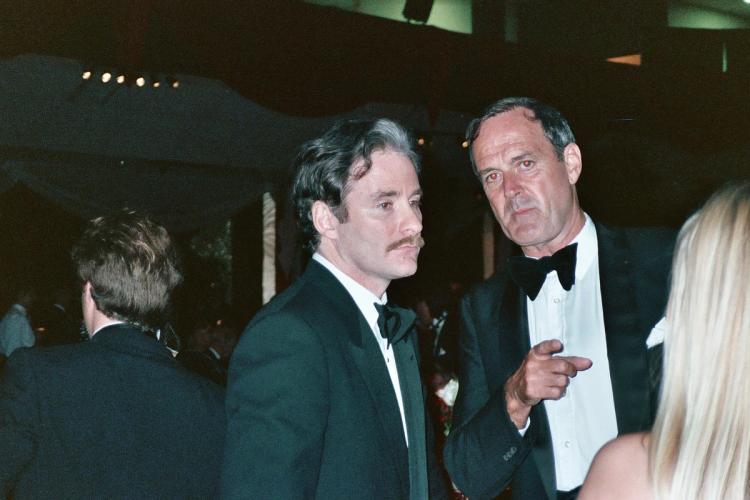The Black Knight guards a small bridge over a stream. King Arthur and his knights attempt to cross the river, but The Black Knight is not having it. “None shall pass,” he repeats. King Arthur begins a duel with him, cutting off his limbs one by one. Unable to believe that he is fighting a pointless battle, The Black Knight resolutely fights on.
The year is 1975 and across the Atlantic, in London, 36-year-old John Marwood Cleese is at the peak of his career, a core member of the Monty Python comedy troupe. Known for sketches like the Ministry of Silly Walks, The Dead Parrot, and The Four Yorkshiremen, (all of which have individual Wikipedia pages), “The Beatles of Comedy,” are in full swing. 1975 features the release of Python’s first feature-length film, Monty Python and the Holy Grail, an unhinged, iconic take on the King Arthur story. Later that year, the first season of Fawlty Towers premieres, co-written by Cleese and his then wife, Connie Booth, following the antics of Basil Fawlty (Cleese), his long-suffering wife Sybil (Prunella Scales), stereotypical Spanish waiter Manuel (Andrew Sachs), and Polly (Booth), the voice of reason and also another waiter.
Forty-eight years on, if the lightbulb of Twitter had not so vehemently attracted the moth of Cleese, it would be safe to legitimately wonder what he was up to. Take an interaction from four months ago. Quote-tweeting children’s author-turned-rampant TERF JK Rowling, Cleese writes, “I've asked this question before...If I do not agree with some of the Transgender arguments, this apparently makes me transphobic So...if they do not agree with some of my opinions, does that make them Cleesephobic? Or does the hatred only flow in one direction?” His question is pointedly vacuous. An earlier tweet shows Cleese lamenting his inability to be a Cambodian policewoman. You can find him on Twitter, or X, @JohnCleese.
At 84 years of age, Cleese isn’t quite at the Dick Van Dyke/Henry Kissinger level of jaw-droppingly old, though he’s getting there. In a way, it’s sad that he repeatedly drags himself back into the public consciousness down the "wokeness is killing comedy” path. A bit of mystery surrounding his whereabouts would be nice. But there is no space for wondering.
Cleese’s downfall from national treasure to social media addict is split between “he was always headed there” and “how on earth did this happen?”. Eoghan Lyng suggests that Cleese has become the embodiment of “brawny, bratty Basil Fawlty”, letting his alter-ego come out of the woodwork and consume him. There is something to the theory of comedians becoming their worst characters (Ricky Gervais turning into the British Office’s David Brent). Maybe it comes from a fear of losing relevance, of trying to grip onto the dying embers of a once-beloved public perception.
If Cleese’s bigotry, or whatever you wish to call it, was strictly confined to the sinking ship of Twitter, we could expect to be hearing less from him whenever the platform crashes and burns. Unfortunately, Cleese seems determined to keep his head above the parapet—in part by signing a letter in solidarity with Rowling, and, more recently, hosting an upcoming talk show on GB News.
GB News is an interesting byproduct of the UK’s current interest in The Culture War, where right-wing reactionaries posing as wronged, cancelled underdogs vent their respective frustrations against wokeness. Cleese’s GB News show is to be executive produced by right-wing comedian Andrew Doyle, whose own weekly show, Free Speech Nation, covers pressing issues such as Meghan Markle, whether swimwear parades should return to the UK, how transgender people are a plague on God’s sweet earth, Meghan Markle, and more.
Cleese should fit right into GB News’s house style; in 2018, he announced his move to the small Caribbean island Nevis, and in 2019 he took to Twitter to bemoan the lack of Englishness in England, presumably from his newfound Nevisian home. It is unclear whether or not Cleese will make the trip back to the UK to film his GB News show, or if that too will be broadcast from Nevis.
Cleese’s push from broadly socially liberal politics towards the right is symptomatic of the increasingly individualistic nature of political conversation in the UK. A space has been created for anyone to weigh in on anyone else’s identity politics and then broadcast their sadness on their own TV show. It’s easier to complain about being cancelled than to do a little less talking and a little more listening.
What, then, is an alternative path that Cleese could have taken? One answer comes from fellow Monty Python member, Eric Idle, whose social progressiveness and less obviously over-inflated ego make him more well-regarded. In response to a report released about an upcoming stage production of The Life of Brian detailing the collaboration between Cleese and Idle, Idle posted on Twitter :“I have nothing at all to do with this production or adaptation. Apparently Cleese has cut the song. Of course.”
Many of the characters Cleese plays are tropes of an older generation of British nostalgia. Before he himself got old, these figures were exaggerated comic throwbacks, like the old boys from Dad’s Army. As Cleese transformed into the sort of character he used to mock, he lost the ability to reflect on this type of imperial nostalgia. It’s a useful reminder that there but for the grace of god, we might all go one day.
--
"Kevin Kline & John Cleese" by Alan Light is licensed under CC BY 2.0.
Daisy Steinhardt is a UK based freelance journalist. She writes about politics, human rights, films, and things that annoy her.
